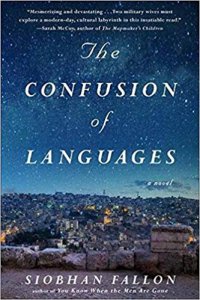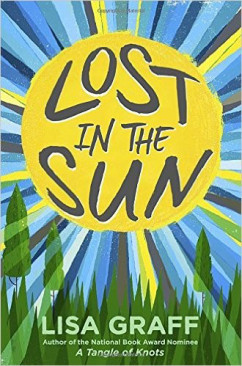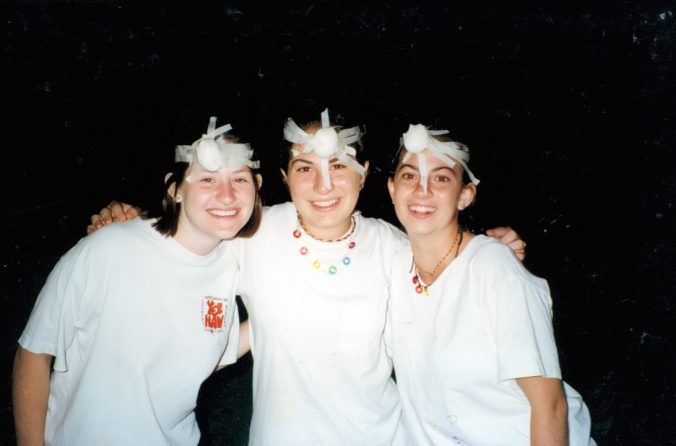
The Confusion of Languages
By Siobhan Fallon
Putnam — June 27, 2017
$26.00, 324 pages
Siobhan Fallon made a huge impression on me with her debut story collection, You Know When the Men Are Gone (2011), about the experience of military wives living at Fort Hood, Texas, and the men who leave them and later return in a range of challenging mental and physical states.
Fallon, who lived at Fort Hood and now resides in Abu Dhabi, United Arab Emirates, returns with her first novel, The Confusion of Languages, set in Jordan during the Arab Spring uprising in May 2011. It is the story of two American women whose military husbands work at the U.S. Embassy in Amman. Cassie and Dan Hugo have been in Jordan for a while and are asked to serve as mentors to a newly-arrived (and newly married) couple, Margaret and Creighton (known as Crick) Brickshaw. Cassie has mixed feelings about mentoring Margaret, but she soon decides that a new friend, with a baby in tow, would be a good thing so far from home.
The plot is set in motion when Margaret and Cassie are involved in a minor rear-end car accident. Margaret is astonished the local police officer ‘s brief, on-the-spot investigation concludes that the accident was her fault. Cassie’s explanation that in Jordan the woman is always at fault, as a legal and cultural matter, falls on deaf ears. An embassy guard, called to the scene by Cassie, explains that Margaret simply needs to go to the police station to complete some paperwork admitting fault, and the embassy will take care of everything after that. It’s Jordan, and they do things differently here. Upset, Margaret decides to go home first so she can change, feed her baby, and then go to the police station while Cassie babysits. But the hours pass and Cassie does not hear from Margaret, nor does Margaret respond to Cassie’s increasingly perplexed and agitated texts. Cassie begins to worry about her naive and emotional friend.
Margaret is as complex a character as one is ever likely to meet, the classic naif in this “fish out of water” tale.
Before long, the plot of The Confusion of Languages becomes as much a thriller as a cultural exploration and character study. Fallon tells the story through Cassie’s first-person narrative over the afternoon and evening of May 13, 2011, and Margaret’s journal, which Cassie discovers and then reads while she waits for Margaret to return from the police station.
Cassie soon learns that Margaret has a secret that could change everything.
Margaret is as complex a character as one is ever likely to meet. Slender, blonde, and pretty, and seemingly extroverted, she is in fact carrying two heavy burdens. Margaret is loquacious, effusive, kind-hearted, and curious, the classic naif in this “fish out of water” tale. But, as we soon learn from her journal, she is also introspective and something of an intellectual.
She is struggling with her mother’s recent death from cancer and an oppressive childhood. She has placed all her hopes on her new life with Crick and their baby, Mather. Crick, the ultimate warrior, is trying to fulfill his sense of duty toward Margaret despite complications in their past.
Can this small-town girl find her way as a military spouse in the Middle East? She finds life in Jordan chaotic and difficult to understand. So, at the same time she is studying Arabic, she is also obsessed with the meaning of words in English, writing their definitions in her journal. She attempts to impose order on the chaos of the world and her life, trying to make sense of the incomprehensible.
Cassie’s efforts to guide Margaret through her transition to life in Jordan’s complicated culture are often met with stubborn resistance and her determination to do things her way.
Cassie is coping with her own sense of loss in not being able to have a baby, and it is driving a wedge between her and Dan. Cassie is methodical and reasonable where Margaret is impulsive and unpredictable. Their friendship is erratic, moving from a developing intimacy to perplexing distance without any pattern.
Cassie’s efforts to guide Margaret through her transition to life in Jordan and to teach her about Jordanian culture, especially expectations regarding male-female interactions, are often met with stubborn resistance and Margaret’s determination to do things her way, without concern for Jordanian and Muslim customs. Margaret is certain that her warmth, kindness, and American “can do” approach will be sufficient in every situation.
Cassie and Margaret may speak the same language, but they frequently misinterpret each other’s words, actions, and intentions.
But she is mistaken. Her innocent attempts to form friendships with Saleh, the maintenance man in her apartment building, and Hassan, a widower who works as one of the entrance guards at the embassy and who teaches her words and phrases in Arabic, lead to confusion and misunderstandings that go beyond “the confusion of languages.”
Cassie and Margaret may speak the same language, but they frequently misinterpret each other’s words, actions, and intentions. Margaret eventually rejects Cassie as her guide to Jordan, preferring to find her own way and place her trust in her new father-figure of a friend.
The Confusion of Languages probes the ramifications of these misunderstandings and the characters’ good intentions gone awry. Both Cassie and Margaret are good people, but they are flawed and deeply human. Here, as always in good fiction, that is what makes for a memorable novel. Although their alternating perspectives create a rich, insightful character development, I was occasionally distracted by the nature of Margaret’s journal, which seems overly sophisticated and literary for a journal but, admittedly, does make for a more compelling read. Fallon is reportedly now at work on a novel about foreign laborers in Abu Dhabi, so she appears to be carving out a niche as the novelist of the expat experience in the Middle East.
Advertisements Share this:




